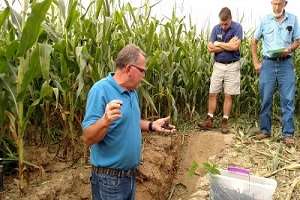By Shelby Burlew
Conservation practices across all sectors of agriculture in Michigan are considered a “win-win” situation for both farmers and the environment. So what is the simple definition of conservation? Merriam-Webster defines conservation as “the protection of animals, plants and natural resources” and “the careful use of natural resources to prevent them from being lost or wasted.” According to the USDA Natural Resources Conservation Service (NRCS), major land use natural resource concerns throughout the United States include:
- Erosion by wind and water
- Maintaining and enhancing soil quality
- Water quality and quantity
- Plant condition and health
- Wildlife habitat

Michigan State University Extension recognizes that conservation combines a farmer’s land management skills with science-based technology to help ensure the following: clean water, clean air, soil health, abundant wildlife, healthy environment and energy conservation. No matter whose definition you use, conserving our natural resources is a good practice.
Conservation programs are available to Michigan farmers through the USDA NRCS, and both farmers and forest owners are encouraged to submit applications for conservation financial assistance by December 16, 2016. Cost-share for implementing conservation practices, also known as best management practices (BMPs), will help to reduce soil erosion, improve wildlife habitat, protect water quality and manage private forest land. Funding is available through the USDA NRCS Michigan Environmental Quality Incentives Program, and completed applications, that are received by December 16, 2016, will be ranked and considered for funding in 2017. Examples of conservation practices that could be funded include: windbreaks, nutrient management plans, cover crops, forest management plans, crop residue and tillage management, and animal waste storage facilities. For a complete list of BMPs available for cost-share, please contact your local NRCS office or visit Michigan Environmental Quality Incentives Program.
Special consideration for conservation financial assistance is provided for conservation priority areas as determined by Michigan NRCS. These priority areas include: farmers seeking verification with the Michigan Agriculture Environmental Assurance Program (MAEAP), high tunnels projects located in Wayne and Genesee counties, honey bee habitat projects, conservation practices for organic producers and/or producers transitioning to organic production and energy conservation.
Farmers and land owners should work with their local NRCS office in developing a conservation plan specific to their farming or forest operation prior to submitting applications for conservation financial assistance. Applications for cost-share are accepted on a continuous basis throughout the year. For more information, please visit your local NRCS office or visit Michigan NRCS.
Source: msu.edu